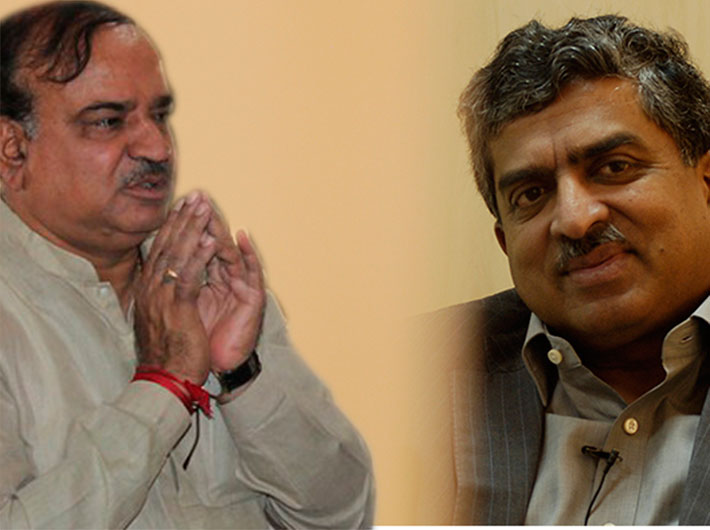Unlike north Indian states, there is no visible Modi wave in Karnataka, and infighting has found a home in both Congress and BJP
The Bharatiya Janata Party (BJP) leadership in Karnataka should have been sitting pretty in this Lok Sabha election, considering it has a substantial base that gave the party a chance to rule the state for five years till 2013. Karnataka was looked upon as the only state in the south which would add to the numbers Narendra Modi was planning to get in the rest of the country, particularly northern and western India, to become the prime minister.
But as the last burst of campaigning ensues, the picture does not seem as pretty as the saffron party would have hoped for in this southern ‘bastion’. To be fair to the BJP leaders, complacency is not a word that exists in their dictionary. They are putting in all they can to ensure the man they want as prime minister is not disappointed, and they realise the advantages of popularising the name of Modi. But aside from the fact that there is little sign of any Modi wave across the state, what is significant is the state BJP leaders are using Modi’s name to fight anti-incumbency for Lok Sabha representatives seeking reelection.
This is not to say there is no pro-Modi sentiment, at least in the urban areas of the state. Or that Modi’s name is not known to people in rural areas. But it is more of a top-down wave imposed on the people, unlike Indira Gandhi’s bottom-up wave, that the BJP leaders are attempting in order to tide over a fall in vote share, as happened nearly 11 months ago when the Congress returned to power in the assembly elections.
Of course, the BJP vote share has to be added to that of the Karnataka Janata Party (KJP), whose leader BS Yeddyurappa has since returned like the prodigal son, at the behest of Modi.
But such is the focus of the BJP leaders that Yeddyurappa has hardly toured the state. This is in stark contrast to the assembly elections, when he was leading a regional outfit after leaving the BJP following removal as the chief minister for his alleged involvement in various scams. In the last couple of weeks, Yeddyurappa has possibly made solitary visits to some of the critical constituencies, largely those of his close associates. This is due to a clever move by Janata Dal (S) leader and former prime minister HD Deve Gowda, who has fielded Geeta Shivarajkumar, daughter-in-law of legendary Kannada film icon Dr Rajkumar and daughter of late S Bangarappa, in their home district of Shimoga. This has left Yeddyurappa virtually tied down to his constituency.
In the end it is quite possible that Yeddyurappa will not be let down by the constituents of his home district, which was the focus of his development strategy as chief minister.
In caste they trust?
But despite all the development slogans of the Modi-led central leadership, the BJP is fighting the Congress in every constituency banking on traditional caste equations. In short, BJP representatives are taking shelter under Modi to fight anti-incumbency, projecting the pro-Modi undercurrent as the solution to all electoral challenges – hoping that a Modi wave would emerge at the last moment to get them past the post.
The situation could have perhaps been better if the party was a more cohesive unit, without the Yeddyurappa versus Ananth Kumar friction, and not mirrored factionalism of the Congress.
Yeddyurappa’s return, however, is expected to bring in an overwhelming majority of votes of the major upper caste group of Lingayats, the community to which he belongs, along with votes of other communities the KJP had taken away – like those of the scheduled tribes. In the assembly elections, the Lingayat votes had split between the BJP and the KJP, with even Congress securing nearly a third of these votes.
The Congress, meanwhile, is making all efforts to hold on to its social axis of other backward classes, minorities and scheduled castes and tribes, popularly known by its acronym in Kannada: ‘Ahinda’. The party’s principal leader, chief minister Siddaramaiah, is fighting for consolidation of these votes amid apprehension among Congress activists that this vote, which brought him to power last year, is not as united as it was thought to be.
This is a critical time for Siddaramaiah because if the Congress gets less than 15 seats – it got nine in the 2009 general elections – the knives will be out in the party to unseat him as chief minister.
With word out that the Siddaramaiah government is in jeopardy, a positive development for the chief minister is consolidation of the Kuruba or shepherd community votes and Muslim votes, a combination that could tilt the balance in over half a dozen constituencies.
Siddaramaiah’s pet programmes like the Annabhagya, (subsidised foodgrain scheme), and the Ksheerbhagya (daily distribution of milk to schoolchildren), announced soon after he was sworn in, are also seen as a winning card. Even BJP leaders admit in private that these could be game-changers for Siddaramaiah.
The new voters
There is also the critical factor that reflects the demographics of the country. Karnataka is among the states where young voters constitute a sizeable section of the electorate. In the last five years the number of new voter registrations, of largely young people, has risen by 35 lakh, with the figure up by 15 lakh only between January and March this year. There is, thus, an addition of an average 90,000 voters in each constituency.
The lowest addition – 51,000 – has been in the coastal constituency of Karwar, where Prashant Deshpande, son-in-law of NCP leader and union minister Praful Patel and son of Karnataka minister RV Deshpande, is contesting on a Congress ticket.
The highest addition – a remarkable 2.74 lakh voters – has come in Bangalore North constituency, where former chief minister Sadanand Gowda of BJP is seeking to enter the Lok Sabha. Bangalore South, where LK Advani’s protégé Ananth Kumar is playing the Modi card to fight IT icon Nandan Nilekani, has an addition of 2.14 lakh new voters.
The enthusiasm seen in voter registrations has caused some amount of trepidation among Congress leaders. It is a factor that could turn into an unguided missile for the Congress given the BJP’s total focus on popularising Modi’s name.
“We don’t know how the young members of Ahinda, leaving aside the Kurubas and the Muslims, will vote. That is certainly a worrisome aspect,” said a Congress leader who did not want to be identified for obvious reasons.
Political analyst Madan Mohan said: “The new voter is bothered only about the immediate past, the present and the future. Their propensity to look for immediate solutions is evident.”
That, he said, is what is making all parties sweat it out extra in this election: “it’s a tough one.”
Tough, and difficult to call as of now. As a BJP leader (name withheld on request) put it, “If this Modi undercurrent turns into a wave, we are sure to get 18 or 20 seats. If it does not happen, it is 10 to 11 seats for the BJP, with two going to the JD(S).”
Karnataka would vote on April 17, and the Congress and BJP could well share the seats, in more or less equal numbers, with a couple going one way or the other.

